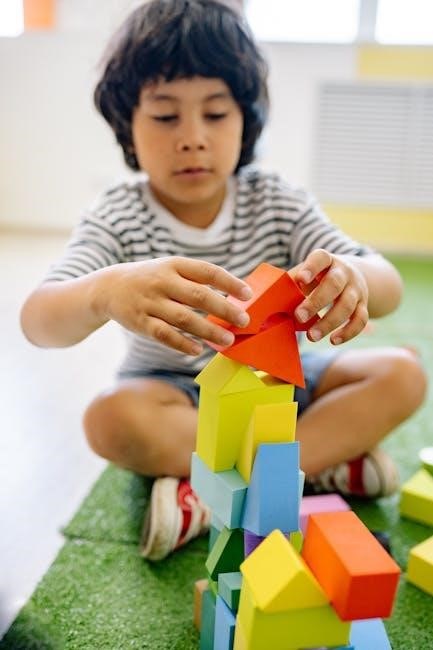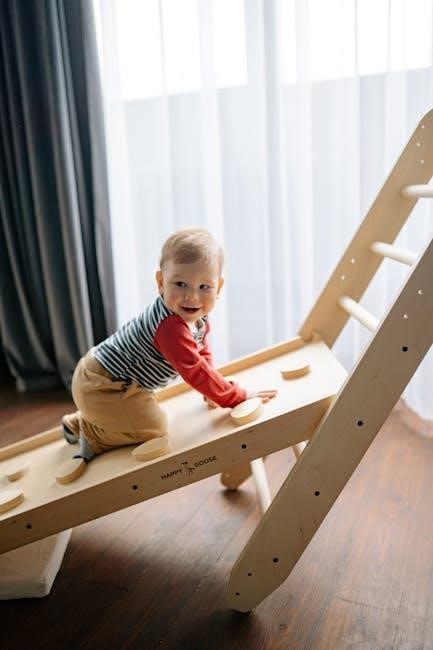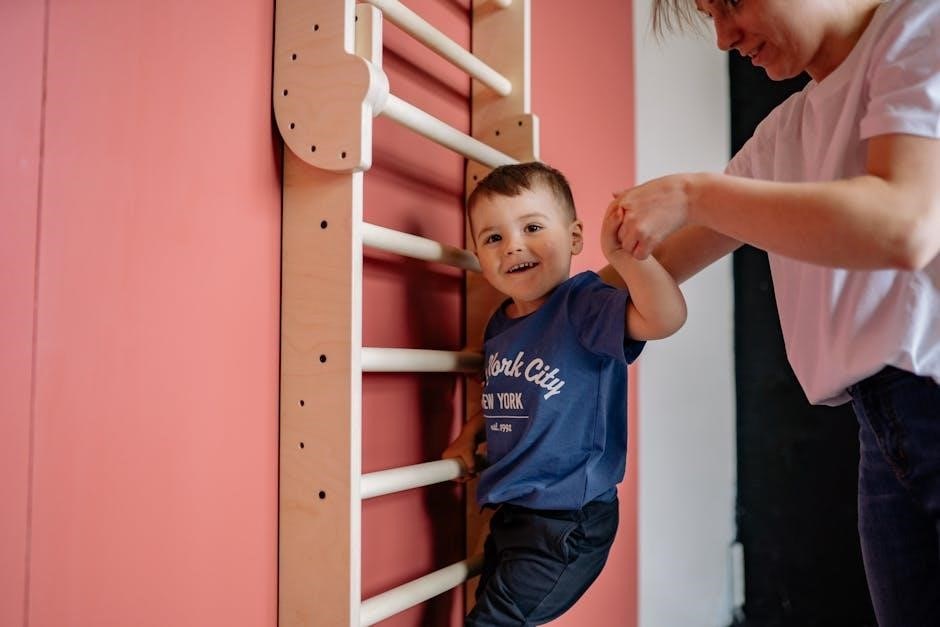Oral motor exercises are essential for improving speech‚ feeding‚ and motor skills in toddlers. These exercises strengthen facial muscles and enhance coordination‚ aiding overall development. Downloadable PDF guides offer practical activities for parents and caregivers to support their child’s growth effectively.
1.1 What Are Oral Motor Exercises?
Oral motor exercises are specialized activities designed to strengthen and improve the coordination of the muscles in the mouth‚ face‚ and jaw. These exercises target the lips‚ tongue‚ and cheeks‚ enhancing their mobility and function. They often involve simple movements like blowing bubbles‚ using straws‚ or protruding the tongue. These activities are essential for developing proper speech‚ feeding‚ and swallowing skills in toddlers. Regular practice can help improve overall oral coordination and address developmental delays. PDF guides provide detailed routines for parents and caregivers to follow at home.
1.2 Importance of Oral Motor Skills in Toddlers
Oral motor skills are foundational for speech‚ feeding‚ and overall development in toddlers. Strong oral motor abilities enable clear communication and proper chewing and swallowing. These skills also enhance sensory integration‚ helping children process textures and tastes. Weak oral motor skills can lead to challenges like speech delays or feeding difficulties. Strengthening these skills early supports healthy development and boosts confidence as children learn to express themselves effectively. PDF guides often highlight these benefits‚ offering practical strategies for improvement.
Benefits of Oral Motor Exercises for Toddlers
Oral motor exercises improve speech clarity‚ enhance feeding skills‚ and boost sensory integration. They strengthen facial muscles‚ promoting better coordination and confidence in communication and eating. PDF guides emphasize these benefits.
2.1 Improved Speech and Language Development
Oral motor exercises significantly enhance speech and language development in toddlers by strengthening the muscles used for articulation. Activities like blowing bubbles and Straw Drinking improve coordination‚ leading to clearer speech. These exercises also boost sensory integration‚ which is crucial for language processing. Downloadable PDF guides provide structured routines to target specific speech challenges. By incorporating these exercises‚ parents and caregivers can help their toddlers develop stronger communication skills‚ fostering confidence and clarity in their ability to express themselves effectively.
2.2 Enhanced Feeding and Swallowing Skills
Oral motor exercises play a crucial role in improving feeding and swallowing skills in toddlers. By strengthening the muscles of the mouth‚ jaw‚ and tongue‚ these exercises enhance coordination and control during meals. Activities like straw drinking and blowing bubbles help improve suction and swallowing reflexes‚ reducing difficulties with feeding. Additionally‚ sensory play with mouth-friendly toys can desensitize the mouth‚ making mealtime more comfortable. Downloadable PDF guides offer tailored exercises to address specific feeding challenges‚ ensuring a smoother transition to solid foods and independent eating.

Simple Oral Motor Exercises for Toddlers
Engage toddlers with fun‚ easy exercises like blowing bubbles‚ straw drinking‚ and tongue protruding. These activities enhance mouth coordination and strength‚ promoting developmental milestones naturally and effectively.
3.1 Blowing Bubbles
Blowing bubbles is a fun and effective oral motor exercise for toddlers. It strengthens the muscles in the cheeks and lips‚ improving coordination and breath control. This activity encourages proper articulation and speech development. To make it more engaging‚ use bubble wands or machines. Toddlers will enjoy chasing and popping bubbles‚ making it a playful way to enhance their motor skills. Regular practice can also improve their ability to form sounds and words clearly. A simple yet impactful activity for daily routines!
3.2 Using Straws to Drink
Drinking through straws is a simple yet effective oral motor exercise for toddlers. It helps improve lip rounding‚ cheek stability‚ and tongue coordination. Using straws strengthens the muscles in the mouth‚ enhancing articulation and speech clarity. Start with wide straws for easier suction and gradually introduce narrower ones to increase difficulty. This activity also promotes proper breathing and swallowing techniques. It’s a practical and fun way to support oral motor development‚ making it easy to incorporate into daily routines while fostering healthy feeding habits and overall motor skill growth.
3.3 Tongue Exercises (Protruding‚ Lateral Movements)
Tongue exercises‚ such as protruding and lateral movements‚ are crucial for improving oral motor skills in toddlers. Protruding involves sticking the tongue out and moving it from side to side‚ enhancing strength and control. Lateral movements focus on sliding the tongue against the inside of the cheeks‚ boosting coordination. These exercises help with speech articulation‚ feeding‚ and swallowing. Parents can encourage these activities by using mirrors for visual feedback‚ making it engaging and effective for developing essential motor abilities in young children.

Activities to Incorporate into Daily Routines
Incorporate activities like making funny faces in the mirror and sensory play with mouth-friendly toys to naturally enhance oral motor skills in a playful‚ engaging way daily.
4.1 Making Funny Faces in the Mirror
Making funny faces in the mirror is a engaging oral motor activity that encourages toddlers to explore and strengthen their facial and mouth muscles. By sticking out their tongues‚ blowing kisses‚ or puffing out cheeks‚ children naturally improve coordination and strength. This activity also provides sensory feedback‚ helping them understand how their movements feel. It’s a simple‚ playful way to incorporate oral motor practice into daily routines‚ fostering both physical development and creativity‚ guided by parents or caregivers. This fun exercise can be adapted to suit different ages and abilities‚ making it universally beneficial.
4.2 Sensory Play with Mouth-Friendly Toys
Sensory play with mouth-friendly toys is a delightful way to encourage oral exploration and motor skill development in toddlers. Using textured teethers‚ soft fabric books‚ or chewable toys can stimulate the mouth and surrounding areas. These activities help improve tactile awareness‚ strengthen oral muscles‚ and enhance sensory integration. By incorporating toys that promote safe mouthing and exploration‚ parents can support their child’s natural curiosity while fostering essential motor skills. This play-based approach is both engaging and effective for young learners‚ making it a valuable addition to daily routines.

When to Start Oral Motor Exercises

Oral motor exercises can begin as early as 12–18 months‚ especially if signs of delayed speech or feeding challenges are observed. Early intervention supports better outcomes.

5.1 Signs Your Toddler May Benefit from These Exercises
Toddlers showing speech delays‚ difficulty articulating words‚ or trouble with feeding may benefit from oral motor exercises. Excessive drooling‚ chewing difficulties‚ or limited tongue movement are key indicators. If your child struggles to transition to solid foods or exhibits unclear speech‚ these exercises can help. Consult a speech-language pathologist if you notice these signs‚ as early intervention can significantly improve their oral motor skills and overall development.
5.2 Recommended Frequency and Duration
Oral motor exercises for toddlers should be practiced consistently‚ ideally 2–3 times daily. Each session can last 5–10 minutes‚ depending on the child’s attention span. Start with shorter sessions and gradually increase as your child becomes more engaged. Incorporate these exercises into daily routines‚ such as during bath time or before meals‚ to make them a natural part of your child’s schedule. Consistency is key to improving oral motor skills effectively. Always ensure the exercises are fun and engaging to maintain your child’s interest and participation.
Expert Recommendations and Resources
Consult speech-language pathologists for personalized oral motor exercises. Utilize free downloadable PDF guides and online resources for practical activities and expert tips to support your toddler’s development effectively.

6.1 Consultation with Speech-Language Pathologists
Consulting a speech-language pathologist (SLP) provides personalized guidance for oral motor exercises tailored to your toddler’s needs. SLPs offer expert strategies to improve speech‚ feeding‚ and motor skills. They assess your child’s abilities and create custom plans to address delays or challenges. With their support‚ you can incorporate activities like blowing bubbles or using straws effectively. SLPs also provide progress tracking and adjustments to ensure your child meets developmental milestones. Their professional insight is invaluable for maximizing the benefits of oral motor exercises. Regular consultations ensure a structured and effective approach to your toddler’s growth.
6.2 Free Downloadable PDF Guides
Free downloadable PDF guides offer a wealth of information on oral motor exercises for toddlers. These resources provide step-by-step instructions‚ activities‚ and tips to support your child’s development. Many guides include exercises like blowing bubbles‚ straw drinking‚ and tongue movements. They often feature visual aids and progress-tracking tools. Designed for parents and caregivers‚ these PDFs are practical and easy to implement at home. By downloading these guides‚ you can access expert-recommended activities to enhance your toddler’s oral motor skills effectively and conveniently.
Oral motor exercises significantly benefit toddlers’ speech‚ feeding‚ and motor skills. Incorporating these simple activities into daily routines fosters healthy development. Encourage your child with patience and consistency.

7.1 Summary of Key Points
Oral motor exercises are vital for enhancing toddlers’ speech‚ feeding‚ and motor skills. Activities like blowing bubbles and straw drinking improve coordination and strength. Incorporating these exercises into daily routines promotes healthy development. Parents can access free downloadable PDF guides for practical tips and expert recommendations. Consulting speech-language pathologists ensures personalized support. Consistent practice and patience yield significant benefits for toddlers’ overall growth and independence.
7.2 Encouragement to Try the Exercises
Encourage your toddler to embrace oral motor exercises as a fun‚ engaging way to boost their development. These activities are simple‚ effective‚ and can be seamlessly integrated into daily routines. By starting early and staying consistent‚ you’ll help your child build stronger speech‚ feeding‚ and motor skills. Witness their progress with joy and confidence‚ knowing you’re providing a foundation for their future success. Begin today and watch your toddler thrive!